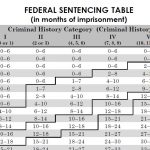Inside This Article
- What is the new federal sentencing guidelines rule on acquitted conduct in 2025?
- How do the revised federal drug sentencing guidelines affect low-level offenders in Michigan?
- What are the new sentencing enhancements for machinegun conversion devices under federal law?
Changes to Federal Sentencing Guidelines
What’s new, what matters, and what’s coming next to the Federal Sentencing Guidelines

Why the Guidelines Change and Why Defense Lawyers Must Stay Current
The United States Federal Sentencing Guidelines are updated periodically by the U.S. Sentencing Commission. These changes respond to new legal developments, shifts in sentencing policy, and practical concerns raised by judges, lawyers, and the public. Some changes adjust offense levels, which measure the severity of the charge. Others add enhancements or clarify how judges apply discretion during a sentencing hearing. Every amendment carries consequences for those facing charges in federal court.
Any lawyer who handles federal cases in the United States District Court for the Eastern District of Michigan must know the guidelines in detail, including every recent revision. The difference between a fair sentence and a devastating one often comes down to whether your lawyer understands how the guidelines apply and how they’ve changed. At LEWIS & DICKSTEIN, P.L.L.C., we track every update, analyze every amendment, and use that knowledge to fight for our clients during plea negotiations, at trial, and at sentencing.
Excluding Acquitted Conduct at Sentencing
Courts may no longer increase a defendant’s guideline range based on acquitted conduct. The amendment to federal sentencing guideline §1B1.3 excludes federally acquitted conduct from the scope of relevant conduct used to calculate a sentence. Courts still retain discretion under 18 U.S.C. § 3661 to consider any information at sentencing, but it no longer factors into the guideline range.
This change restores fairness to defendants who are acquitted of some but not all charges at trial. A jury’s “not guilty” verdict now blocks the government from using that same conduct to increase a sentence. The Commission responded to criticism from courts, legal experts, and members of Congress who called the practice fundamentally unjust. Juries acquit twenty percent of defendants facing multiple charges of one or more of them. Prior to this amendment, judges could increase those defendants’ sentences based on the acquitted conduct.

Drug Sentencing Reforms for Low-Level Roles
The Commission revised §2D1.1 and §3B1.2 of the federal sentencing guidelines to more clearly address the roles of low-level participants in federal drug offenses. The changes expand the low-level participant role by doing the following:
- Set offense level caps at 30 or 32 for defendants who receive a mitigating role adjustment
- Provide examples to guide judges in applying the adjustment more consistently
These reforms reflect years of data and public comment showing that defendants facing minor drug delivery charges often received sentences nearly identical to high-level traffickers. The new structure gives judges better tools to differentiate based on actual responsibility and conduct.
Clarifying the Fentanyl Mens Rea Standard
The amendment to the federal drug sentencing guidelines also clarifies the mental state required for certain enhancements involving fentanyl or fentanyl analogues under §2D1.1(b)(13)(B). Courts had struggled with vague standards that led to inconsistent outcomes. The United States Sentencing Commission changed how courts apply enhancements in fentanyl cases. This amendment adds a new subparagraph (B) under §2D1.1(b)(13) of the Federal Sentencing Guidelines.
Under this new provision, a defendant may receive a two-level enhancement if both of the following apply:
- The defendant represented or marketed a substance containing fentanyl or a fentanyl analogue as a legitimately manufactured drug, and
- The defendant “recklessly disregarded” the fact that the substance was or contained fentanyl.
This revision broadens the scope of the enhancement. In the past, courts could only apply this increase if the government proved the defendant knowingly misrepresented fentanyl as another drug. Now, prosecutors may seek the enhancement even if the defendant did not know the exact nature of the substance, as long as the evidence shows they deliberately ignored the truth or avoided confirming it.
By including willful blindness, the amendment targets individuals who turn a blind eye to what they are selling. Defense lawyers must be ready to challenge the government’s claim that a client ignored obvious signs or red flags. The change gives courts a clearer framework but also raises the stakes for anyone accused of misrepresenting drugs containing fentanyl.
New Enhancements for Machinegun Conversion Devices In the Federal Sentencing Guidelines
The Commission created a new specific offense characteristic for machinegun conversion devices (MCDs), also known as Glock switches or auto sears. These devices convert semiautomatic firearms into fully automatic weapons. The updated §2K2.1 in the federal sentencing guidelines includes:
- A two-level increase for possessing four or more devices or attempting to transfer one
- A four-level increase for possessing 30 or more devices
These enhancements address the growing threat posed by automatic weapon conversions and give courts a clear, structured way to increase penalties in serious cases. The amendments will significantly increase the sentencing guidelines for those facing MCD charges.

Streamlining the Sentencing Framework
The Commission eliminated Step Two of the three-step sentencing process that required consideration of departures under the guidelines before turning to § 3553(a). In practice, courts had already shifted away from Step Two after landmark cases such as United States v. Booker and Gall v. United States.
Now, judges move directly from calculating the range to considering statutory factors. The new approach simplifies the process and aligns formal procedure with what most courts already do.
Supervised Release: Toward Individualized Sentencing
The Commission revised Chapters Five and Seven to encourage more individualized decisions about supervised release. Courts now have clear authority to:
- Decide whether to impose supervised release at all
- Set the length based on the person’s needs and risks
- Tailor conditions based on facts, not default rules
These changes eliminate outdated mandatory rules and recognize that many people succeed without prolonged or unnecessary supervision.

Why The Changes to the Federal Sentencing Guidelines Matter
These changes to the federal sentencing guidelines affect real people. The guidelines influence how federal cases are charged, how plea negotiations unfold, and how sentences are determined. At LEWIS & DICKSTEIN, P.L.L.C., we are adept at these rules and know how to use them to our clients’ advantage. We prepare every case with the most current law in mind and use every advantage the guidelines allow.
When your future is on the line, you need a defense team that knows the law, knows how to fight, and knows how to win. That’s what we do!
Call us today at (248) 263-6800 for a free consultation or complete an online Request for Assistance Form. We will contact you promptly and find a way to help you.












